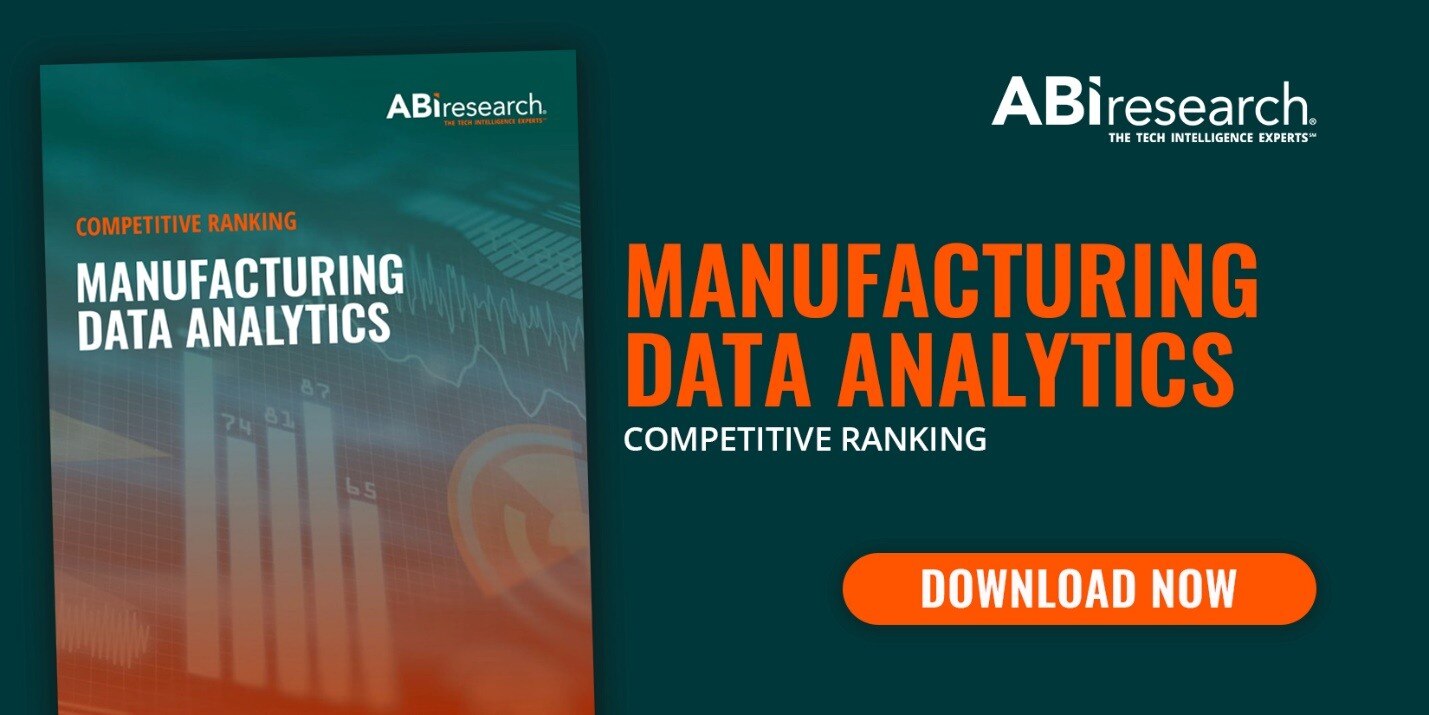Manufacturers, in their digital transformation journey, increasingly require advanced data analytics solutions to optimize their plant operations. More specifically, data analytics is an essential technology for the proactive monitoring of production line equipment, in the form of predictive maintenance, production line optimization, and accommodations for additional orders. Software providers’ means of delivering these solutions vary widely, as evidenced in ABI Research’s recently released Manufacturing Data Analytics competitive ranking. The report assesses 10 different suppliers of data analytics software for manufacturing companies and identifies the top innovators and implementers of said solutions. This post will summarize how some of these companies made it to the top of the list.
What Makes Manufacturing Data Analytics Software Innovative?
Major developments in the field of data analytics have been observed in recent years. In order to accommodate a wide range of industry protocols, the latest trend is to ensure the data are cleaned and normalized. The use of low-code/no-code interfaces is now ubiquitous across the manufacturing sector, with more professionals relying on data analytics solutions as part of their daily work routine. From simply providing alerts, analytics capabilities have expanded to identify the root cause of issues and provide manufacturers with actionable insights to optimize equipment and operations. Leading digital transformation technology vendors are enabling their customers to integrate their findings in industrial applications like Product Lifecycle Management (PLM), Manufacturing Execution Systems (MESs), and digital twins. According to our recent analysis, Altair and PTC are among the top two companies with innovation scores above 80, closely followed by Sight Machine.
The three most innovative data analytics software suppliers in the manufacturing industry are as follows:
- Altair: Leading our innovation rankings, Altair’s manufacturing data analytics solutions can manage not only structured data, but also unstructured data (e.g., MongoDB database). The data, with the support of Deep Learning (DL) and Machine Learning (ML), can be collected from a diverse range of protocols, data historians, and industrial applications. After completing data cleansing procedures, manufacturers can apply over 250 modeling methods with Altair’s software to identify the causes of deviations and transfer the results to Augmented Reality (AR). This enables engineers and design teams to address the problems and deploy what-if models, frequently working together via digital replicas.
- PTC: The Boston, Massachusetts-based software company, PTC, performs well in providing expertise across the manufacturing value chain. The firm offers Kepware to collect data via various inputs, such as Programmable Logic Controllers (PLCs) and Computer Numerical Control (CNC) machines. Manufacturers can leverage the ThingWorx solution to apply business logic and accommodate multiple data streams. The Digital Performance Management (DPM) solution from PTC aids in issue identification and resolution, integrates data for industrial manufacturing applications, and presents results on dashboards to support a company's digital thread goals.
- Sight Machine: Manufacturers can use Sight Machine’s data analytics solution to identify the causal relationship between changing performance parameters. This solution also allows the client to assess how any changes affect other operational domains. Another reason Sight Machine landed in the top-three most innovative data analytics software suppliers is due to its inclusion of Software Development Kits (SDKs). This allows manufacturers to tailor the solution to their liking and develop digital twins for observing asset behavior.
Best Implementers of Data Analytics Software
Our implementation criteria include a manufacturing analytics supplier’s commercial user base, geographic reach, solution accessibility (e.g., cloud availability), and scalability, among other things. The best data analytics software implementers are in a good spot to support a manufacturer's technicians and operations globally.
- Seeq: With a substantial user base and diverse partner network position, Seeq lands in the top spot for manufacturing data analytics implementation. The company is positioned favorably within the market as organizations increasingly seek to comprehend time series data. Moreover, the software supports a variety of languages (including English, French, German, Spanish, Portuguese, and Japanese) and offers templates for various use cases facilitating the deployment of the data analytics solution across multiple manufacturing facilities.
- Altair: Altair offers multilingual interfaces, including Japanese and Korean, for its manufacturing analytics software solutions. With Altair's Partner Alliance, which includes various global System Integrators (SIs) and leading tech companies, manufacturers can scale the solution across their production plants. Additionally, customers can maximize their investment by using the Online Altair Academy.
- Sight Machine: Partnerships with Accenture, EY, and the Azure Marketplace make Sight Machine very scalable for manufacturing customers, helping the company grow its user base rapidly. The data analytics solution is a Software-as-a-Service (SaaS) offering available on both public and private clouds, and has multilingual support. Manufacturers appreciate that the Sight Machine data analytics product works straight out of the box, and they can be reimbursed if they don’t achieve their Return on Investment (ROI) goal.
Aligning Data Analytics Solutions with Manufacturers’ Pain Points
Attracting manufacturers requires data analytics software providers to pinpoint exactly what industrial organizations are struggling to overcome in their operations. The following points are key to finding favor among the industrial segment:
- The data analytics solution must support the many communication protocols that manufacturers use for industrial equipment (e.g., OPC-UA, Modbus, CAN bus, LoRaWAN, and BACnet).
- Manufacturers aren’t merely looking to collect data; they need the solution to make contextual sense (timestamps, batch numbers, shift numbers, etc.).
- Charts and dashboards can help manufacturers get more value from data analytics software, providing a visual medium for operational assets.
- Data cannot be siloed off because manufacturers, in their efforts to create a digital thread, need to share data across multiple departments. Application Programming Interfaces (APIs) are essential here as they connect data analytics with other enterprise applications, such as Enterprise Resource Planning (ERP) systems and Product Lifecycle Management (PLM) applications.
For the full competitive ranking of 10 manufacturing data analytics providers, download the report.





